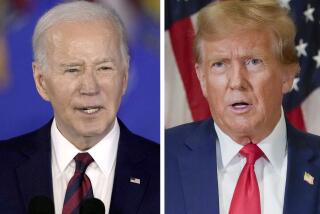Bush Regaining His Taste for Fund-Raising
- Share via
CRAWFORD, Texas — President Bush, under pressure from fellow Republicans eager to hold their slim margin in the House and recapture control of the Senate, is beginning to embrace the role of presidential campaigner.
Early in his tenure, Bush shied from fund-raising, seeking to set himself apart from the openly aggressive approach President Clinton took in building Democrats’ treasury chests. Then, in the first months after the Sept. 11 attacks, he ruled it out altogether, recognizing that overtly political activity would have been unseemly.
There is no such skittishness at the White House these days. Bush has begun reaching out for dollars with the ease of a successful telemarketer dialing busily at the dinner hour.
By rough count, since Jan. 1 he has spoken at fund-raising lunches and dinners that have brought in about $12 million, bringing his total as president to roughly $60 million.
Last week, on his way to Crawford for an Easter holiday at his 1,500-acre ranch, he stopped in Greenville, S.C., to raise money for Rep. Lindsey O. Graham’s race for an open Senate seat, and in Atlanta for Rep. Saxby Chambliss, who is seeking to defeat incumbent Democratic Sen. Max Cleland in Georgia. The day after Bush arrived at the ranch, he flew aboard the Marine One helicopter to Dallas to boost the campaign of Texas Atty. Gen. John Cornyn, who is running for the Senate.
The three stops picked up about $4 million.
For Bush, that is the most he can do for a candidate this early in the season. In the fall, he can encourage voters to go to the polls. But as candidates contemplate their advertising budgets in the spring, a presidentially enhanced bank account can provide the foundation for a well-financed race to the finish line.
“The money is the biggest piece” of what a president can offer, said one veteran of Democratic presidential races who is watching the White House’s spring political calendar with interest.
Beyond his willingness to speak once a week, on average, at political fund-raising parties this season, Bush’s shift to politics is most visible in the message he is delivering.
To be sure, he is using his speeches to support the war on terrorism--a message that serves to link his favored candidate with a popular cause.
But he also has been moving in recent days to lay out differences with Democrats.
Bush initially had been reluctant to follow such a course, because he sought to ease away from the bitterness of the 2000 election campaign and the dispute over the Florida ballot.
But consider the message audiences pay $1,000 a head to hear these days.
He defends his tax cuts as a prescription to boost economic demand and expand jobs.
“Now, some folks evidently don’t understand that,” he said at the Chambliss dinner. “They’ve been reading a different textbook than Saxby and I read. You see, they either want to delay the tax cut or raise your taxes. We need somebody in Washington, a friend of the taxpayer, a vote we can rely on.”
He embraces the idea of drilling for oil in Alaska’s environmentally sensitive Arctic National Wildlife Refuge, hailing Graham, for instance, for supporting greater exploration of new energy sources.
And he rails against the Democrat-controlled Senate’s refusal to vote on his nomination of U.S. District Judge Charles W. Pickering Sr. of Mississippi to a seat on the U.S. 5th Circuit Court of Appeals.
“We need people like John Cornyn in the United States Senate who will work with the White House to have a solid judiciary, to make sure that the judges do what they’re supposed to do in the United States and not overstep their bounds,” Bush said in Dallas.
It is a pace and message likely to continue throughout the coming months, interrupted only by the demands of foreign travel--the president has scheduled a trip to Russia, Germany and France in May, and another to Canada soon afterward.
This week, he plans to be in Philadelphia to boost the Republican gubernatorial candidate.
His goal reaches beyond the midterm elections in November. Longer range, the outcome will determine how much of his agenda is enacted in the next congressional session. It could also test whether, if he seeks reelection in 2004, he can run on his legislative accomplishments or against a Congress that thwarted him.
More to Read
Get the L.A. Times Politics newsletter
Deeply reported insights into legislation, politics and policy from Sacramento, Washington and beyond. In your inbox three times per week.
You may occasionally receive promotional content from the Los Angeles Times.










